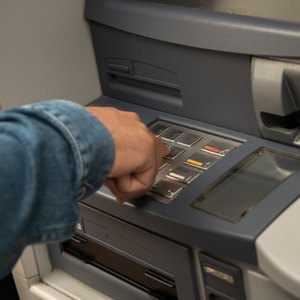
When an ATM screen shows your card as restricted, that means your bank is hard at work protecting you from fraud or some other problem. Banks, credit unions, brokerage accounts and other debit card issuers take great pains to prevent fraud, and you are the beneficiary of their problem-detection systems. By freezing a suspect card, thieves are stopped from using it to raid your account and steal your money.
Tips
If an ATM card is restricted, you won't be able to use it, as it has likely been frozen to protect you from fraud.
Causes of Restriction
When your debit/ATM card is restricted, you won’t be able to use it again until you and your financial institution resolve the problem. Banks tend to be very protective of account holders, so they are on the lookout for unusual card usage.
For example, if you live in Chicago and your card is suddenly used at a Las Vegas casino, your bank might restrict your card and ask you to verify the usage. Another warning flag would be an unusual purchase of a big-ticket item or an attempt to empty out your bank account at an ATM. Each bank sets its own system of alerts that might cause it to restrict your card.
Other possible causes of restriction include someone reporting the card lost or stolen or by request from a third party, such as a law enforcement agency. In addition, a bank might freeze your account if it is overdrawn, you owe fees to the bank or a third party places a lien on your account.
How to Respond
The bank will want to talk to you about why it restricted your card. It will first try to verify your identity, often by sending you an email or text message with a code. Or it might ask you for identifying information, such as for the last four digits of your Social Security number or the answer to a secret question. Once the bank is sure it’s really you, a representative will explain the reason for freezing your card.
In some cases, your financial institution might cancel the card and send you a new one. This is typical if your card is lost, stolen or used fraudulently. On the other hand, the bank might lift its restriction if you reassure it about a questionable transaction. For example, you might actually be vacationing in Las Vegas and really did request money at a casino’s cash machine.
High-Tech Threats
Card skimming is one way thieves steal debit card account numbers and PINs. Thieves might install a skimming device, which illegally reads card information, on legitimate card readers and ATMs, and then exploit the information to use your account information fraudulently. Data breaches are another threat, in which hackers steal troves of private information and use it to compromise your accounts.
How to Protect Your Cards
The Federal Trade Commission says you should protect your card’s PIN by never disclosing it to others, not carrying it in your wallet or pocketbook and not writing it down on deposit slips, envelopes and other papers that might be looked at. The FTC also advises you to promptly check your account statements each month and look for unauthorized card usage. It also warns against disclosing your card number or bank account number over the phone. Finally, it advises you to cut up old cards before throwing them away.
Read More: How to Protect the Strip on a Credit Card
References
- CNBC: Here's Another Reason to Think Twice Before Using Your Debit Card
- WJLA: Chase Puts Restrictions on Debit Card Users Due to Target Breach
- Cleveland.com: What Happens When Your Bank Asks Strange Questions to Verify Identity?
- Board of Governors of the Federal Reserve Board. "Electronic Fund Transfer Act," Page 12. Accessed Sept. 14, 2020.
Writer Bio
Eric Bank is a senior business, finance and real estate writer, freelancing since 2002. He has written thousands of articles about business, finance, insurance, real estate, investing, annuities, taxes, credit repair, accounting and student loans. Eric writes articles, blogs and SEO-friendly website content for dozens of clients worldwide, including get.com, badcredit.org and valuepenguin.com. Eric holds two Master's Degrees -- in Business Administration and in Finance. His website is ericbank.com.

